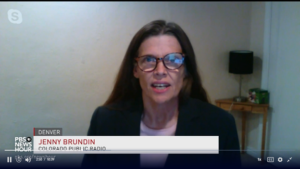In this week’s newsletter: A data-sharing initiative leads to a slew of stories on the state of chronic absenteeism across the country. “Zoom in a room” returns in some places with teacher shortages. What makes the reporting of Colorado Public Radio’s Jenny Brundin so innovative and satisfying? A new book from an education journalist comes out next week. And one reporter dreams up a cheeky answer to a Wall Street Journal airport store.
CHRONIC ABSENCE
The big story of the week
So much of national education coverage lately has been focused on culture wars — the AP African American Studies class, book bans, LGBT student policies, etc. So I was happy to see a flood of coverage over the last week on a significant issue I’d argue is under-covered: chronic absenteeism.
About 6.5 million more kids enrolled in school are missing weeks or months of classes compared to before the pandemic (AP). A million of those students are in California alone (EdSource). Partnering with EdSource, the Associated Press shared data via their Education Reporting Network with newsrooms across the country, from Alaska to North Carolina, who published more than a dozen of their own localized stories. Besides California, Oregon, New Mexico, and Michigan are among the states with the worst rates of absenteeism (Oregonian, Albuquerque Journal, Detroit News, Detroit Free Press). But some districts, like in Fort Worth, Texas, are faring better — though still far above pre-pandemic numbers (Fort Worth Star-Telegram).
AP education editor Chrissie Thompson told us the project grew out of the AP’s Missing Students project earlier this year, which showed how thousands of students disengaged completely from school during the pandemic.
“Throughout this project, our team has aimed to shift the national conversation back to these most vulnerable students, whose futures hang in the balance,” she told us.
Other big stories of the week:
BUSING PROBLEMS: Students in Louisville finally returned to school today after a bus schedule meltdown last week left students perpetually waiting for the bus in the morning and being dropped off hours late in the afternoon (AP). The new bus routes that caused the fiasco were instituted in response to a bus driver shortage — a problem plaguing much of the country since the pandemic (USA Today, New York Times, WAFB Baton Rouge). Elsewhere, kids are riding in overcrowded and hot buses (Dallas Morning News). Ahead of the first day in Boston Public Schools, a district that has historically struggled with student transportation, city officials say they are finally fully staffed with bus drivers (WBUR, GBH).
UNIVERSAL FREE MEALS: Massachusetts is the latest state to adopt universal free school meals for all public school students, relieving families that are already struggling with back-to-school costs (Huffington Post, WBUR, The 74). It is one of nine states that will offer free breakfast and lunch — compared to zero before the pandemic (Chalkbeat).
MORE AP CONTROVERSY: Following in Florida’s footsteps, the Arkansas Department of Education warned schools on the first day this week not to offer the AP African American Studies class, saying it may violate state law and won’t count toward students’ graduation credit (New York Times, AP, USA Today). Meanwhile, in Florida, teachers are starting the new year uncertain about how they might be impacted by some new laws, including on the teaching of African American history (NBC News). Despite the overwhelming attention to these stories, it’s important to remember that overall the AP course is popular and will be tested in about 800 high schools this year — a huge increase from the 60 schools that piloted it last year (USA Today).

RETURN OF ‘ZOOM IN A ROOM’
The best education journalism of the week
The best education story of the week is Linda Jacobson’s Exclusive Data: Fueled by Teacher Shortages, ‘Zoom-in-a-Room’ Makes a Comeback in The 74. Her jaw-dropping story (complete with creepy animated graphic) details how school districts struggling to fill teaching vacancies are spending sometimes millions on distance-learning outfits like the Texas-based Proximity Learning and the New York-based Fullmind for not just hard-to-staff classes but core subjects, according to The 74’s review of purchase orders. Has “Zoom-in-a-room” returned?
In one South Carolina district, Jacobson details how students were wandering out of class during lessons, prompting the school board to spend $18,000 on high-tech cameras that allow virtual teachers “to see the entire classroom.”
Response online was swift and mostly incredulous. New York parent Karen Vaites, who pushed for a return to in-person classes during the pandemic, linked to the piece below a tweet that read simply: “< primal scream >.”
A handful more great education stories:
Covid, ADHD, race: Parents explain why they home-school their kids (Washington Post series on homeschooling continues here)
Inside the campaign to cancel sex ed (Popular Information)
Chicago is seeing an influx of migrant students. Are schools ready to serve them? (Chalkbeat Chicago)
As her daughter with special needs heads to college, this Chicago mom wants better for students left behind (WBEZ Chicago)
Lacking political power in California, conservatives turn focus to local school boards (LA Times)
‘It’s completely gutted’: Wildfires claim Lāhainā teacher’s classroom and house (Hawaii Public Radio)
The new “science of reading” movement, explained (Vox)
These State Schools Also Favor the One Percent (The Atlantic)

WHAT MAKES CPR’S JENNY BRUNDIN SO GOOD
Our latest columns and commentary
If you don’t know the work of Colorado Public Radio education reporter Jenny Brundin, you’re missing out.
In addition to covering more typical education stories such as school board politics, school safety, and academic performance, Brundin takes listeners to places they might otherwise learn nothing about, such as naturalization ceremonies and cafeteria-food conventions.
She also pays attention to story details that are so often missing from other education reporting: kids’ goofiness and playfulness and long free-flowing thoughts from rambling sources.
The Grade contributing writer Will Callan writes that these are the things that make her stand out as an education reporter and a master of radio. Read this week’s appreciation of her work, which is full of tips for other reporters looking to break out of the mold.
MICROSCHOOLS TAKE OFF
Coverage of promising school innovations & signs of progress
Reported from an unconventional classroom in the back room of a Jewish temple, this story highlights the rise of “microschools” and why they are popular among some parents — namely because they offer a smaller, more student-centered and community-focused school setting than some public schools (Christian Science Monitor).
A city-funded teacher training program in San Francisco is increasing the number of Black early childhood educators by covering tuition costs, providing $10,000 in stipends, giving out laptops, and making class schedules flexible (KQED).
Another new teacher training program in Los Angeles is helping parents become teachers with flexible classes — a benefit to both the future teachers as well as the schools that are looking to hire educators who really know their students (EdSource).
In Chelsea, Mass., teen parents are graduating from high school against the odds thanks to a program that provides them with a district employee who makes sure they get academic and counseling support and connects them to agencies providing health care, child care, housing, and mental health support (Boston Globe).

PEOPLE, JOBS
Who’s going where and doing what
Above: Former Coronavirus Schools Briefing writer Amelia Nierenberg will report on Connecticut for the New York Times, including issues in education.
🔥 Career moves: Hechinger Report alum Lillian Mongeau Hughes is leaving her post as the health and justice editor at Oregon Public Broadcasting to focus on her own writing. Another Hechinger alum, Tara García Mathewson published her first story on the higher ed beat for The Markup on how AI detection tools are falsely accusing international students of cheating. And former New York Times Education Briefing newsletter writer Amelia Nierenberg is joining the metro desk for a few months to cover Connecticut, including issues in education. Check out my 2020 appreciation for Nierenberg when the newsletter focused on COVID and schools.
🔥 Books: Education reporter Laura Meckler published an excerpt of her book in the Washington Post. “Dream Town: Shaker Heights and the Quest for Racial Equity” comes out next week. Chalkbeat editor Cara Fitzpatrick’s publish date for her book, “The Death of Public School,” has been delayed to Sept. 12. And Richard D. Kahlenberg’s book “Excluded: How Snob Zoning, NIMBYism and Class Bias Build the Walls We Don’t See” got a review from Valerie Strauss in the Washington Post.
🔥 Jobs & opportunities: WHYY is still looking for an education reporter. Decaturish is looking for a freelancer to help with DeKalb Schools coverage. Email editor@decaturish.com for more. The American Educational Research Association is taking nominations for the Excellence in Media Reporting on Education Research Award until Oct. 12. And IRE’s Francisco Vara-Orta is encouraging high school journalists to apply to the San Antonio Express-News Team Teen program, which he says “changed my life and got me published at age 15.”
🔥 Impact: Kudos to Wall Street Journal reporters Melissa Korn, Andrea Fuller, and Jennifer S. Forsyth whose investigation into large spending increases at state flagship universities has led to calls from university trustees, faculty, and staff for more transparent financial data.
🔥 Freedom of the press: The Education Writers Association released a statement of support for the Marion County Record after police officers raided the newsroom. “As a nation, we must continue to protect those who report and expose the injustices within our communities and uphold federal law that defends journalists against search and seizure,” EWA executive director Kathy Chow said.
APPEARANCES, EVENTS, & NEW RESOURCES
What’s happening and new research
⏰ Media appearances: The Washington Post’s Laura Meckler was on NPR’s Fresh Air talking about her book “Dream Town” and the link between academic tracking and school segregation. Louisville Public Media’s Jess Clark was on WBUR Here & Now talking about the disastrous bus system rollout last week. WBUR education reporter Carrie Jung was on the station’s podcast The Common talking about Massachusetts’ early childhood care investments. WHYY’s Aubri Juhasz talked about her podcast “Schooled” and the stark differences in Pennsylvania public schools on the station’s show Studio 2. And NBC News’ Mike Hixenbaugh was on EWA Radio talking about his approach to education reporting.
⏰ Upcoming: EdSource is hosting an online roundtable discussion on Aug. 24 about their reporting on chronic absenteeism. (FutureEd also hosted a discussion about how to reduce chronic absenteeism on Wednesday.) Join AP education editor Chrissie Thompson and global business editor Noreen Gillespie for a panel at the Grantmakers for Education annual conference on empowering local newsrooms to focus on stories that matter. See the full schedule here.
⏰ Research: A new study on enrollment data in Michigan shows that the pandemic exacerbated the trend of students leaving public schools and suggests that the trend will continue. An analysis from FutureEd shows a correlation between missed days and lower NAEP scores. The AP reported that 23 states have enacted restrictions on transgender girls playing on girls sports teams. The Hechinger Report’s Jill Barshay provided a research roundup on social-emotional learning in schools. Chalkbeat’s Matt Barnum looked at research suggesting that summer school has boosted math scores post-pandemic, but hasn’t made a big dent in curbing overall learning loss. And according to the Wall Street Journal, at least 16 states have tried to pass legislation requiring students to repeat the third grade if their reading test scores are too low.
THE KICKER

The idea of the week goes to Chalkbeat’s Susan Gonzalez.
“What would it take for local news outlets to get fancy airport stores? We would only sell 10 things (all for under $1) but you’d be forced to listen to the cashiers telling you about the latest city council drama & when your local school board elections happen.”
ABOUT THE AUTHOR

Alexander Russo
Alexander Russo is founder and editor of The Grade, an award-winning effort to help improve media coverage of education issues. He’s also a Spencer Education Journalism Fellowship winner and a book author. You can reach him at @alexanderrusso.
Visit their website at: https://the-grade.org/












